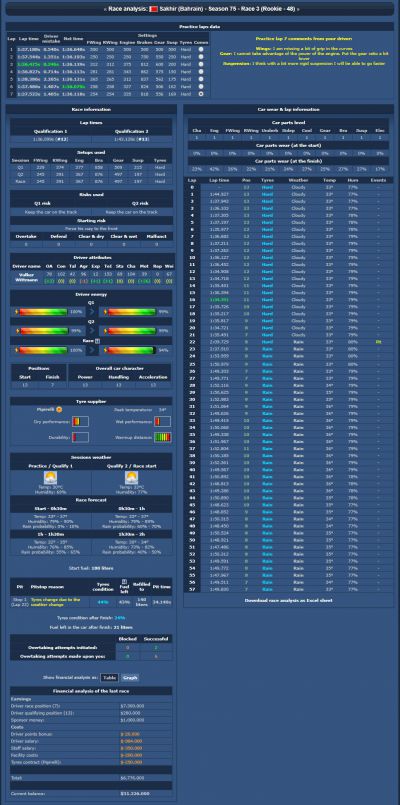Difference between revisions of "Race Analysis"
From The GPRO Wiki
PurpleWitch (talk | contribs) (Created page with "__NOTOC__400px|thumb|An Example of the Race Analysis PageThis is one of the most important pages of GPRO, as it provides all the information you nee...") |
PurpleWitch (talk | contribs) m |
||
| Line 1: | Line 1: | ||
| − | __NOTOC__[[Image:Raceanalysis. | + | __NOTOC__[[Image:Raceanalysis.jpg|400px|thumb|An Example of the Race Analysis Page]]This is one of the most important pages of GPRO, as it provides all the information you need to formulate future race strategies. If you save data from only one page, then this is the one you should select. |
By comparing the track details, weather, tyre wear, and fuel consumption - with a little analysis and basic mathematics, you can quickly begin to collate tyre wear percentages and fuel consumption rates, that will help you build an archive of data to better formulate your future estimates and race strategies. | By comparing the track details, weather, tyre wear, and fuel consumption - with a little analysis and basic mathematics, you can quickly begin to collate tyre wear percentages and fuel consumption rates, that will help you build an archive of data to better formulate your future estimates and race strategies. | ||
Latest revision as of 20:21, 21 March 2020
This is one of the most important pages of GPRO, as it provides all the information you need to formulate future race strategies. If you save data from only one page, then this is the one you should select.
By comparing the track details, weather, tyre wear, and fuel consumption - with a little analysis and basic mathematics, you can quickly begin to collate tyre wear percentages and fuel consumption rates, that will help you build an archive of data to better formulate your future estimates and race strategies.
Some Examples
Using the image opposite, you could quickly collate the following observations:
Fuel Consumption:
- Start Fuel: 118 litres (remember fuel tank has a 180 litre capacity)
- Pitstop: 1% remaining in tank, Refilled to 100 litres.
- End of Race: 12 litres remaining
Therefore:
- Fuel put into car: (118+100) 218 litres
- Fuel not used: 1% (180/100 = 1.8 litres) + 12 litres = 13.8 litres
- Total fuel used: 218 - 13.8 = 204.2 litres
If the full race distance was 300km, then we could easily work out our overall consumption quite easily:
- 300km ÷ 204.2 litres = 1.47km per litre.
- 204.2 litres ÷ 300km = 0.69 litres per km.
Collate this information for a number of races, and you should then be able to begin accurately predicting how much fuel you should expect to use in each race.
Tyre Wear:
- Pitstop: Lap 40
- Tyre condition at pitstop = 19% remaining
- Lap length: 4.286km
Therefore:
- 40laps x 4.286km = 171km to 81% wear.
Leading to the following conclusions:
- 171km ÷ 81% wear = 2.11km per 1% wear.
- 81% wear ÷ 171km = 0.474% wear per km.
With these simple percentages, we will then be able to roughly estimate how long "Hard" tyres will last at another track with similar attributes and conditions.
Frequently Asked Questions
In Race Analysis it states fuel left at the end of the stint was 20%. 20% of what exactly?
The fuel left value is the % of the tanks total capacity, the total fuel capacity is 180L. For Example, 20% left. 180/100 = 1.8. 1.8 X 20 = 36Litres
I pitted after 4 laps, yet had more fuel in the tank than I asked the pit crew to add. How can the crew take fuel out of the car? Is this a bug?
No, your car will leave the pits with the amount of fuel already in the tank, the crew will not take fuel out of the car.
